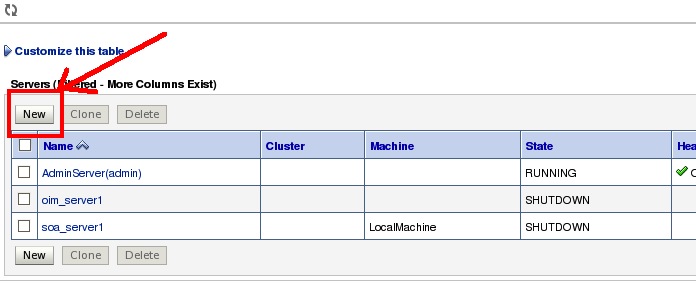Around 1 year ago I came across this issue and could not find a solution. 16-ish months later and I've solved how to have OIA and OIM 11g residing on the same admin domain though on separate managed servers.
You may have arrived on this webpage from the Oracle forum regarding the deployment failure or you're maybe a true IT professional and googled for the following:
Caused by: org.springframework.beans.factory.BeanDefinitionStoreException: Unexpected exception parsing XML document from ServletContext resource [/WEB-INF/security-acls-context.xml]; nested exception is java.lang.NoClassDefFoundError: org/aspectj/weaver/tools/PointcutPrimitive
Either way I hope this helps.
The issue isn't because it cannot locate the class file (the aspectj.jar already exists in the web-inf directory), it's that OIA (built on an older spring framework) is conflicting with other jar version from an application or package on the same domain (in this case, OIM). Here's how to resolve the issue.
I'm assuming you have OIM 11g already installed on the same weblogic domain where you wish to deploy OIA
Create a new managed server

Fairly simple to start off, log into the weblogic admin console and click servers (on the left-hand side) and then click new.
Call the server whatever you desire, in this example the managed server is called oia_server1, click next then click finish. Now you have a managed server ready for OIA
If you haven't followed the installation sets already, view the blog Install OIA 11.1.1.5 ensure you have completed all the steps just before the paragraph 'Locate your downloaded OIA repository (see picture), then click next'.
Go to the $RBACX_HOME/WEB-INF directory and create a new file called weblogic.xml. Within the weblogic.xml file, copy and paste the following:
<?xml version="1.0" encoding="ISO-8859-1"?>
<weblogic-web-app xmlns="http://java.sun.com/xml/ns/j2ee">
<container-descriptor>
<prefer-web-inf-classes>true</prefer-web-inf-classes>
</container-descriptor>
</weblogic-web-app>
</h4>
This will allow the classes within the web-inf to be preferred over any other class file within the domain
Proceed with the installation by continuing from the Locate your downloaded OIA repository (see picture), then click next paragraph within the Install OIA 11.1.1.5 guide though instead of starting up the weblogic admin domain, start the managed weblogic server
The command I used:
./startManagedWebLogic.sh <managed_server_name> http://<hostname_or_ip>:<port_number_of_the_admin_server>
sudo ./startManagedWebLogic.sh oia_server1 http://172.16.128.128:7001
Ensure the user you're using has permissions to start up the weblogic server, root user would be enough (though it's not recommended to start up admin servers/managed servers as root ) a normal user with sudo access would be sufficient.
Common issue - Copy-Pasting
When you copy-paste, make sure that the double-quotes are matching. As you can see within the picture, there's a difference, which causes the application to fail on deployment

About the author
 Daniel is a Technical Manager with over 10 years of consulting expertise in the Identity and Access Management space.
Daniel is a Technical Manager with over 10 years of consulting expertise in the Identity and Access Management space.Daniel has built from scratch this blog as well as technicalconfessions.com
Follow Daniel on twitter @nervouswiggles
Comments
Other Posts
AS I was migrating my environment into an S3 environment, I wanted to leverage off the SES services that AWS provide, more specifically, to leverage the off the SMTP functionality by sending an email via PHP
Read More...
The WeMos D1 is a ESP8266 WiFi based board is an extension to the current out-of-the-box library that comes with the Arduino installation. Because of this, you need to import in the libraries as well as acknowledging the specific board. This process is highly confusion with a number of different individuals talking about a number of different ways to integrate.
Read More...
NameID element must be present as part of the Subject in the Response message, please enable it in the IDP configuration.
Read More...
For what I see, there's not too many supportive documentations out there that will demonstrate how provision AD group membership with the ICF connector using OpenIDM. The use of the special ldapGroups attribute is not explained anywhere in the Integrators guides to to the date of this blog. This quick blog identifies the tasks required to provision AD group membership from OpenIDM to AD using the LDAP ICF connector. However this doesn't really explain what ldapGroups actually does and there's no real worked example of how to go from an Assignment to ldapGroups to an assigned group in AD. I wrote up a wiki article for my own reference: AD group memberships automatically to users This is just my view, others may disagree, but I think the implementation experience could be improved with some more documentation and a more detailed example here.
Read More...
In the past, the similar error occurred though for the Oracle Identity Management solution. invalidcredentialexception remote framework key is invalid Because they all share the ICF connector framework, the error/solution would be the same.
Read More...
org.forgerock.script.exception.ScriptCompilationException: missing ; before statement
Read More...
ForgeRock IDM - org.forgerock.script.exception.ScriptCompilationException: missing ; before statement
Read More...
When performing the attempt of a reconciliation from ForgeRock IDM to Active Directory, I would get the following error
Read More...
In the past, the similar error occurred though for the Oracle Identity Management solution. invalidcredentialexception remote framework key is invalid Because they all share the ICF connector framework, the error/solution would be the same.
Read More...
During the reconcilation from OpenIDM to the ICF google apps connector, the following error response would occur. ERROR Caused by com.google.api.client.auth.oauth2.TokenResponseException 400 Bad Request - invalid_grant
Read More...

